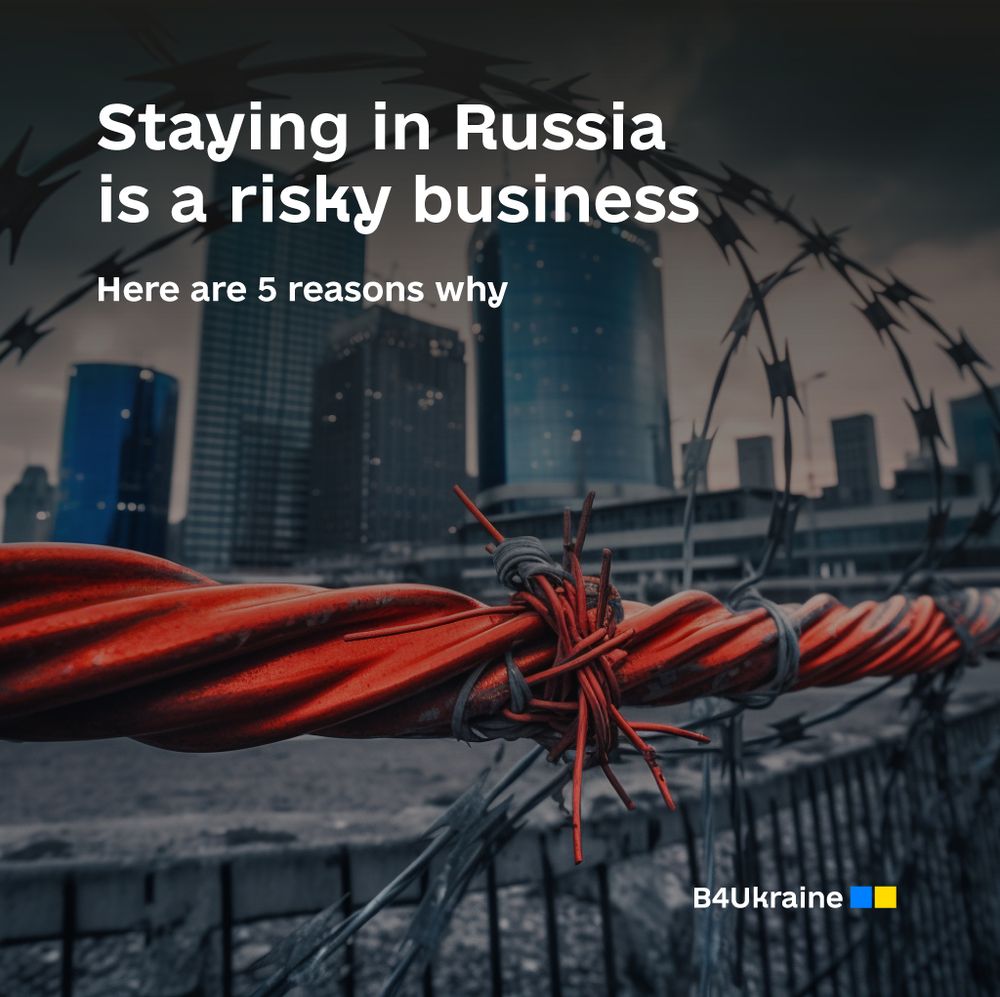
By continuing operations in Russia, companies face severe and increasing risks that may amount to complicity in human rights abuses committed by the aggressor state.
It has been over 15 months since Russia invaded Ukraine, and the devastating impacts continue to shock the global conscience and shake the global economy. Russia is violating international humanitarian law by committing war crimes and crimes against humanity, through attacks on civilians and civilian infrastructure (e.g., mass executions, sexual violence, torture, forcible transfer of civilians). More than 24,000 Ukrainian civilians have been killed and injured and millions more have been forced to flee their homes, creating one of the most significant humanitarian and refugee crises of modern times. In recognition of the severity of abuses, in March 2023 the International Criminal Court issued an arrest warrant for President Vladimir Putin to answer war crimes charges.
In response to the February 2022 invasion, more than 1,000 international companies have curtailed operations in Russia. But those who decided to remain face an expanding universe of financial, legal, and reputational risks in the aggressor state.
1. Legal obligation to support the Russian war effort
On September 21, 2022, Vladimir Putin escalated the war by announcing a “partial mobilization” of the Russian population. The accompanying legislation (Article 9 of Federal Law No. 31-FZ) mandates all organizations, including more than 1,800 international companies that are currently operating on a full or limited scale in Russia, to conduct military registration of their staff if at least one of the employees is eligible for military service. They must also assist with delivering the military summons to their employees, ensure the delivery of equipment to assembly points or military units, and provide information, buildings, communications, land plots, transport, and other material means of support to the war effort.
2. Nationalizing assets
A decree issued by Vladimir Putin on March 3, 2023, enables the Russian government to suspend shareholders’ rights and implement external management in companies that don’t fulfill state defense contracts under conditions of martial law. By specifying the process of appointing Russian government representatives to manage businesses that fail to meet state orders, the latest Decree effectively creates a scenario of “partial nationalization.”
With legislation introducing partial mobilization, nationalization, and potentially martial law in Russia, it is highly likely that corporations will be unable to prevent or mitigate negative human rights impacts, an obligation imposed on companies by the United Nations Guiding Principles on Business and Human Rights.
As such, continuing to conduct business in Russia entails significant legal risks for companies, including potential civil and criminal liability under comprehensive sanctions regimes and recent international jurisprudence holding corporations and their officers responsible for human rights abuses abroad. Companies face the rising risk of criminal liability for complicity in international crimes, which can be prosecuted by domestic courts outside Russia under the doctrine of “universal jurisdiction.”
3. Operational restrictions
On 24 February 2023, The Financial Action Task Force (FATF) suspended Russia’s membership as a result of the war, calling on all actors in the international financial system to exercise extreme caution in all dealings with Russia. In practice, the decision means that all international banks will scrutinize all Russian payments, making financial transactions more expensive and lengthy, with no guarantee that the transaction will occur at all. Although FATF has not yet blacklisted Russia, it highlighted the consensus among its 36 member countries that “the Russian Federation’s actions represent a gross violation of the commitment to international cooperation upon which FATF Members have agreed to implement and support the FATF Standards.” Previous practice shows that non-cooperative behavior is one of the reasons for FATF blacklisting. As a result, companies should examine and mitigate the high levels of risk attached to financial transactions with Russia and based on that risk, companies should reconsider all ongoing business operations related to Russia.
Companies may also be exposed to financially material risks through operational restrictions, such as limitations of future government contracts.
4. Limited access to personal & corporate finances
The Ukrainian government’s National Agency on Corruption Prevention (NACP) is creating a list of “foreign companies that, despite the international recognition of Russia as the aggressor state and the introduced sanctions restrictions, continue to cooperate with it.” These companies are recognised as international sponsors of war. The listed entities will be included in the World-Check database to protect the global financial sector from Russian sponsors of war. Since banks and insurance companies use World-check to assess risks, companies on the list will be limited in freely accessing personal and corporate finances. So far there are 29 companies on the list, but the NACP notes that it will be expanded with “international companies that provide the public and private sector with goods and services of critical purpose, as well as [those that] contribute to the Russian budget.”
5. Reputational damage
In addition to facing material risks in Russia, companies stand to lose reputation and trust, neither of which can be easily regained. Companies that maintain business relationships with Russia risk being perceived as supporting Russia’s war effort. This could have a negative long-term impact on sales in other countries and attract investor scrutiny over adherence to ESG principles. The longer it takes for brands to extricate themselves from the situation, the more damaging it will be for their reputation.
B4Ukraine is calling on the EU, G7 and all other nations committed to a rules-based international order to step in to urge companies to cut ties with Russia and issue market guidance advisories to warn of the heightened risks of continuing business there.